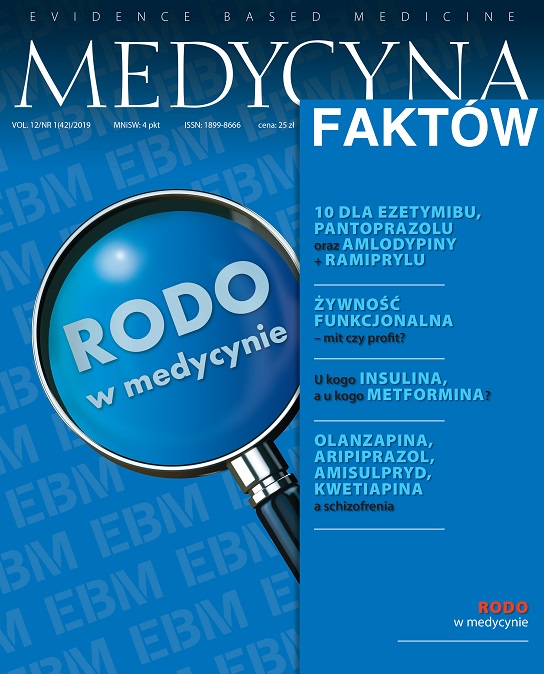Usage of standardized tomato extract in practice – AD 2019 state of art Review article
Main Article Content
Abstract
Inhibiting the ability of thrombocytes to aggregate is one of the basic directions of pharmacotherapy of the cardiovascular diseases. The use of classical antiplatelet drugs, however, is associated with the risk of bleeding complications. Recent studies have shown that the benefits of using acetylsalicylic acid outweigh the risks only in the case of a confirmed cardiovascular disease. In many other situations – in patients with diabetes, hypertension, obesity, with high cardiovascular risk – safe inhibition of platelet activity would also be very valuable. This possibility is potentially created by standardized extract from tomato seeds. This article summarizes current knowledge about the properties of STE and its applicability in practice.
Article Details
Copyright © by Medical Education. All rights reserved.
References
2. Balsam P., Grabowski M.: Analiza właściwości przeciwpłytkowych wystandaryzowanego ekstraktu z pomidorów. Choroby Serca i Naczyń 2014; 11: 1-6.
3. Miazga A., Kostka-Jeziorny K., Begier-Krasińska B., Tykarski A.: Wystandaryzowany ekstrakt z pomidorów (Fruitflow) – czy stanowi alternatywę dla kwasu acetylosalicylowego w profilaktyce pierwotnej chorób sercowo-naczyniowych u pacjentów z nadciśnieniem tętniczym? Nadciśnienie Tętnicze 2014; 18(1): 37-42.
4. Vandvik P.O., Lincoff A.M., Gore J.M. et al.: Primary and secondary prevention of cardiovascular disease: Antithrombotic Therapy and Prevention of Thrombosis, 9th ed. American College of Chest Physicians Evidence-Based Clinical Practice Guidelines. Chest 2012; 141: e637S-e668S.
5. Antiplatelet Trialists’ Collaboration: Collaborative meta-analysis of randomised trials of antiplatelet therapy for prevention of death, myocardial infarction, and stroke in high risk patients. Br. Med. J. 2002; 324: 71-86.
6. O‘Kennedy N., Crosbie L., Whelan S. et al.: Effects of tomato extract on platelet function: a double-blinded crossover study in healthy humans. Am. J. Clin. Nutr. 2006; 84: 561-569.
7. McNeil J.J., Wolfe R., Woods R.L. et al.; ASPREE Investigator Group: Effect of Aspirin on Cardiovascular Events and Bleeding in the Healthy Elderly. N. Engl. J. Med. 2018; 379(16): 1509-1518. DOI: 10.1056/NEJMoa1805819.
8. O‘Kennedy N., Crosbie L., Broom J.I.: Effects of antiplatelet components of tomato extract on platelet function in vitro and ex vivo: a time-course cannulation study in healthy humans. Am. J. Clin. Nutr. 2006; 84: 570-579.
9. O‘Kennedy N., Crosbie L., Song H.J.: A randomised controlled trial comparing a dietary antiplatelet, the water-soluble tomato extract Fruitflow, with 75 mg aspirin in healthy subjects. Eur. J. Clin. Nutr. 2017; 71: 723-730.
10. Krasińska B., Osińska A., Osiński M. et al.: Standardised tomato extract as an alternative to acetylsalicylic acid in patients with primary hypertension and high cardiovascular risk – a randomised, controlled trial. Arch. Med. Sci. 2018; 14(4): 773-780. DOI: 10.5114/aoms.2017.69864.
11. Krasińska B., Osińska A., Krasińska A. et al.: Favourable hypotensive effect after standardised tomato extract treatment in hypertensive subjects at high estimated cardiovascular risk – a randomised controlled trial. Kardiol. Pol. 2018; 76(2): 388-395. DOI: 10.5603/KP.a2017.0215.
12. Uddin M., Biswas D., Ghosh A. et al.: Consumption of Fruitflow® lowers blood pressure in pre-hypertensive males: a randomised, placebo controlled, double blind, cross-over study. Int. J. Food Sci. Nutr. DOI: 10.1080/09637486.2017.1376621.
13. Tykarski A., Narkiewicz K., Gaciong Z. et al.: Zasady postępowania w nadciśnieniu tętniczym – 2015 rok. Wytyczne Polskiego Towarzystwa Nadciśnienia Tętniczego. Nadciśn. Tętn. 2015; 15: 55-82.
14. Wożakowska-Kapłon B., Filipiak K.J., Mamcarz A. et al.: Miejsce wystandaryzowanego ekstraktu z pomidorów w prewencji pierwotnej schorzeń układu sercowo-naczyniowego. Czy i kiedy stanowi alternatywę dla kwasu acetylosalicylowego? Stanowisko grupy ekspertów. Folia Cardiologica 2015; 10(2): 100-105.
15. Paszkowski T.: Terapia antyagregacyjna w prewencji powikłań położniczych. E-medycyna 2014; listopad: 1-3.

